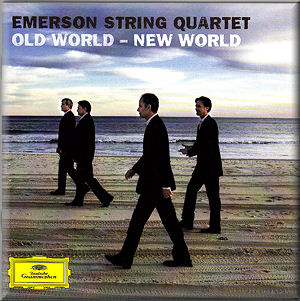|


alternatively
CD: AmazonUK
AmazonUS
|
Antonín DVOŘÁK (1841-1904)
Old World - New World
CD 1
String Quartet No. 10 in E flat major Op. 51, B. 92 (1878/9) [32:03]
String Quartet No. 11 in C major, Op. 61, B. 121 (1881) [39:06]
CD 2
String Quintet No. 3 in E flat major ‘American’ Op. 97, B. 180 (1893)
[32:37]
12 Cypresses arranged for string quartet, B. 152 (arr. 1887) [32:42]
CD 3
String Quartet No. 13 in G major, Op. 106, B. 192 (1895) [37:06]
String Quartet No. 14 in A flat major, Op. 105, B. 193 (1895) [31:48]
 Emerson String Quartet (Eugene Drucker (violin I) (Opp. 51, 97,
Cypresses 7-12) and violin II); Philip Setzer (violin I) (Opp. 61,
105, 106, Cypresses 1-6) and violin II); Lawrence Dutton (viola);
David Finckel (cello); Paul Neubauer (viola) (Quintet, Op. 97))
Emerson String Quartet (Eugene Drucker (violin I) (Opp. 51, 97,
Cypresses 7-12) and violin II); Philip Setzer (violin I) (Opp. 61,
105, 106, Cypresses 1-6) and violin II); Lawrence Dutton (viola);
David Finckel (cello); Paul Neubauer (viola) (Quintet, Op. 97))
rec. December 2008, 2, 4, 6, 9-10 December 2009, American Academy
of Arts and Letters, NYC, USA. DDD
 DEUTSCHE GRAMMOPHON 477 8765 [3 CDs: 71:18 + 65:28 + 69:03]
DEUTSCHE GRAMMOPHON 477 8765 [3 CDs: 71:18 + 65:28 + 69:03]

|
Dvořák composed some of these scores
during his exile in the USA and others in his home city of Prague;
hence the set title. We are told in the booklet notes that the
Emerson have never recorded any of these works before. With such
a theme it feels like an oversight not to have included the popular
String Quartet No. 12, Op. 96, B. 179 (1893) known as the
‘American’ as it would have sat perfectly within this collection.
The Emerson have in fact already recorded the score.
Few composers can match the Bohemia-born Dvořák’s emphasis on
melodic invention and sparkling lyricism. This is coupled with
a rich and individual coloration often deeply rooted in his native
Slavic folk music.
The first disc opens with the earliest completed work here the
String Quartet No. 10 from 1878/9. Brahms had by then become
a staunch champion of Dvořák. Earlier in 1876 the great German
composer had written a letter of recommendation to the publisher
Simrock. The E flat major Quartet, B. 92 was composed in
response to a commission for a “Slavonic” work from
Jean Becker the founder and leader of the Florentine Quartet.
For this reason the score is sometimes called the ‘Slavonic’.
Only a short time later, in 1881, Dvořák wrote his String Quartet
No. 11 for the Viennese Quartet led by its founder Josef Hellmesberger
Sr.
Disc two commences with one of Dvořák’s best known chamber works
the String Quintet No. 3 in E flat major ‘American’.
This specifies an extra viola and was written in 1893 during his
three year stay in the United States working at the New York National
Music Conservatory. Dvořák holidayed at the Bohemian colony at
Spillville, Iowa and there his writing became inspired both by
African-American spirituals and by ritual music of the Native
Americans. Sister works to the ‘American’ Quintet that
were also composed during his stay in the USA include the String
Quartet No. 12 ‘American’ and the Symphony No. 9
‘New World’.
The 12 Cypresses for string quartet, B. 152 originate from
1865 when as a young man Dvořák composed a set of love songs based
on the work of the Moravian poet Gustav Pfleger-Moravský. He arranged
twelve of the songs in 1887 as string quartet movements; the title
Cypresses was conferred at the time of their publication
in 1921. Unfortunately in the booklet the titles are not given.
The third disc of the set has Dvořák’s two final quartets both
completed in 1895 after returning to work at the Prague Conservatory.
The String Quartet No. 13 took Dvořák only a few weeks
to write. A frequently overlooked masterwork of the genre the
String Quartet No. 14 had been started in New York and
was completed in Prague. Overshadowed by the enduring popularity
of the ‘American’ Quartet it is a shame that these
two quartets are not played as often as their quality deserves.
Formed in 1976 the award-winning New York City-based Emerson Quartet
use traditional modern strung instruments. It seems a pointless
exercise to go through the performances of each quartet movement
individually as the Emerson maintain throughout an impressive
and consistent standard of playing in a way that few other quartets
could achieve. With fine musicianship the players handle the challenges
of the varying emotional depth and meter of the scores with accomplishment.
I noted that they eschew any temptation unnecessarily to exaggerate
dynamics. In the ‘American’ Quintet violist Paul
Neubauer fits in seamlessly with the group. I never felt any lack
of emotional attachment; an unfair criticism sometimes levelled
at this elite group. Their technical command and precision is
legendary and their tone has been closely recorded to great advantage
by the DG engineers. It would be hard to imagine these scores
played better.
Michael Cookson
|




 All Nimbus reviews
All Nimbus reviews








